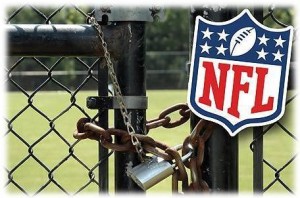The NFLPA may have decertified thus giving up its status, but as a trade association, it can still pack a punch in the ongoing dispute with the league.
The latest rumor has it that the NFLPA is preparing to boycott the April 28-30 draft, by preventing the top prospects from entering the draft. Although nothing official has been heard from the NFLPA regarding the matter, what is certain is that the union met and held conferences with several of the top prospects and that it enjoys full support on that front. With all that in mind, a full boycott of the draft would also be possible – provided there’s consensus amongst the prospects on the matter.
According to the NFL’s Greg Aiello, it is up to the prospects to decide whether they want to show up in New York for the draft or not. Aiello also said that the league planned to invite 15-20 of the best prospects for the “once-in-a-lifetime opportunity,” making it clear that the league would prefer the prospects to show up.
If the lockout will still be in place during the draft, a picket by veteran players at the Radio City Music Hall may also be in the books. Under the lockout, the draft will still be held as scheduled, but teams won’t be allowed to trade players. Draft picks can be traded, however, no players (not even those freshly drafted) can be signed.
The longer the NFL lockout dispute seems to drag out, the less likely the two concerned parties appear to be to inch closer to a possible solution. The latest attempt by US District Judge Susan Nelson to bring the NFL and the NFLPA together has been rebuked by the two sides which apparently can’t set their differences aside regarding the potential scene of such mediated talks.
The Judge proposed to preside over a possible round of negotiations herself, but the NFL replied that – while it was ready to return to negotiations with the players – it would only be willing to do so under the mediation of George Cohen of the Federal Mediation and Conciliation Service. The main reason cited by the league’s Jeff Pash was that having acted as a mediator between the two parties for 16 days before the lockout was instituted, Cohen was familiar with the issue and thus negotiations would not have to start off at square one again.
The NFLPA (or rather the attorneys representing the players) didn’t like the fact that returning to the FMCS could be interpreted as a resumption of collective bargaining, which would endanger the players’ position in the current situation.
Although Pash said the NFL would provide guarantees that it would not attempt to equate the resumption of the talks with collective bargaining, the players rejected his offer citing other reasons like the fact that the 16 days of mediation which Cohen undertook failed to generate the desired results and as such, the entire mediation could be viewed as a failure. Furthermore, according to the attorneys representing the players in the dispute, Cohen did not have binding authority in the matter.
The players accepted the Judge’s proposal, however, with the NFL still adamant to take the issue back to the FMCS, things didn’t appear to be going anywhere after an intense exchange of letters among the various concerned parties.
